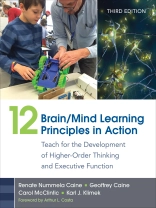Raise the bar with the best of what is known about how the brain/mind learns
Higher-order skills such as critical thinking, planning, decision-making and persistence are the key to success for today’s students. With its novel approach to teaching and learning, 12 Brain/Mind Learning Principles in Action has been the go-to resource for thousands of teachers in leading their students to greater confidence and achievement.
Now in an expanded third edition, Caine et al. offer three practical approaches to instruction—direct, problem or project-based learning, and the guided experience approach—while providing common-sense strategies to turn theory into effective classroom teaching. Features of the new edition include
- More strategies to deeply engage students and build foundational learning skills
- Guidance on peer-based professional development through Process Learning Circles
- Reflective questions and checklists for assessing progress
- Updated, real-life examples that illustrate brain-compatible learning in action
Bridge research to practice through these innovative strategies to create a school environment where students and faculty learn and thrive.
’12 Brain/Mind Learning Principles in Action is a treasure trove of thoughtful, heartfelt, and effective ideas that will empower brains to grow, minds to expand, and classrooms to thrive. In our present system good teaching is often a subversive act – use this as a manual for guerilla warfare.’Louis Cozolino, Professor of Psychology
Pepperdine University
‘This book provides compelling evidence that the traditional paradigm of education, which emphasizes ‘factual’ learning, is profoundly narrow and limiting. The volume, depth, and relevance of research the authors bring to the fore about effective and lasting models of teaching, learning, and leadership is impressive. May its brilliant and enlightening message once and for all replace the limited and limiting habits of mind that have legitimated educational policy and practice for centuries in the Western World.’
William Spady, Director
The 5th Paradigm
Mục lục
Foreword to the Third Edition
Preface
Acknowledgments
About the Authors
1. Getting Started
PART I: The First Foundational Element–Relaxed Alertness
2. Why Relaxed Alertness Provides the Optimum Emotional Climate for Learning
3. Brain/Mind Learning Principle—Complex Learning Is Enhanced by Challenge and Inhibited by Threat, Helplessness, and Fatigue
4. Brain/Mind Learning Principle–The Brain/Mind Is Social
5. Brain/Mind Learning Principle–The Search for Meaning Is Innate
6. Brain/Mind Learning Principle–Emotions Are Critical to Patterning
PART II: The Second Foundational Element–Orchestrated Immersion in Complex Experience
7. Creating the Richest Learning Environments Using Orchestrated Immersion in Complex Experience
8. Brain/Mind Learning Principle–The Brain/Mind Processes Parts and Wholes Simultaneously
9. Brain/Mind Learning Principle–All Learning Engages the Physiology
10. Brain/Mind Learning Principle–The Search for Meaning Occurs Through Patterning
11. Brain/Mind Learning Principle–Learning Is Developmental
PART III: The Third Foundational Element–Active Processing of Experience
12. Helping Learners Digest and Consolidate Learning
13. Brain/Mind Learning Principle–Each Brain Is Uniquely Organized
14. Brain/Mind Learning Principle–There Are at Least Two Ways to Approach Memory
15. Brain/Mind Learning Principle–Learning Engages Both Focused Attention and Peripheral Perception
16. Brain/Mind Learning Principle–Learning Is Both Conscious and Unconscious
17. Teaching with Body/Mind Interconnectedness in Mind
Resource A: The Brain/Mind Capacities Wheel
Resource B: The Brain/Mind Principles Wheel
Resource C: How to Develop Process Learning Circles
Resource D: Guided Experiences Cycle
Resource E: Guidelines for the Guided Experiences Model
Resource F: Global Experiences Design Wheel
Resource G: Sensory Poem
References
Index
Giới thiệu về tác giả
Karl Klimek is the Executive Orchestrator of the Square One Education Network, a nonprofit organization that incorporates brain/mind learning theory and practices in schools, with special focus on science, technology, engineering, and mathematics projects (www.squareonenetwork.org). He is lead author of Generative Leadership: Shaping New Futures for Today’s Schools (2008, Corwin Press), co-author of 12 Brain-Mind Learning Principles in Action: Developing Executive Functions of the Human Brain (2004 / 2008, Corwin Press) and has taught in Washington, Wyoming, and Michigan at both the public school and university levels. His school administrative experience includes service as a principal and as assistant superintendent for curriculum and instruction in a suburban Detroit, Michigan district. Karl is President of 2 Perspectives: Learning Through Leadership (www.2perspectives.us.com) and has worked extensively in career and technology education developing state and federal programs. He is a Senior Associate of the Caine Learning Institute, Idyllwild, CA and is Board Vice President of the Natural Learning Research Institute. Karl received his undergraduate degree in education from Central Washington University and his master’s in educational leadership from Eastern Michigan University. He is recognized for his practical and enthusiastic presentations as a speaker and project development/design facilitator.












